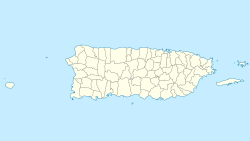Ponce Massacre Museum
|
Casa de la Masacre
|
|

Today the Ponce massacre building is a museum that honors the victims of the massacre and commemorates the infamous event
|
|
|
Location of Ponce and the Casa de la Masacre in Puerto Rico
|
|
| Location | SE corner of Marina and Aurora Streets (32 Marina St.), Ponce, Puerto Rico |
|---|---|
| Coordinates | 18°00′34″N 66°36′49″W / 18.009318°N 66.613537°WCoordinates: 18°00′34″N 66°36′49″W / 18.009318°N 66.613537°W |
| Area | less than one acre |
| Built | 1910 |
| Architect | Blas Silva |
| Architectural style | Ponce Creole |
| NRHP Reference # | 05001098 |
| Added to NRHP | October 20, 2005 |
The Museo de la Masacre de Ponce (the Ponce Massacre Museum) is a museum and historic building in Ponce, Puerto Rico. It depicts the history and events surrounding the Ponce Massacre, which occurred in broad daylight on Palm Sunday in 1937. The museum is housed inside the building where the event itself occurred, with one of its sections devoted to the Nationalist leader, Pedro Albizu Campos. It also documents the blacklisting of Puerto Rican Nationalists performed by the United States, as well as hosting a considerable number of photos from the Nationalist era.
The museum is listed in the U.S. National Register of Historic Places in as Casa de la Masacre (the Massacre House).
After the U.S. invasion of Puerto Rico in 1898, the island's political status within the U.S. became a subject of ardent conversation within Puerto Rican political circles. A number of political parties sprung up as a result, with platforms based on their desired relationship to the U.S.
The three basic party options were independence, statehood, and commonwealth. The "commonwealth" option was a hybrid status of alleged local autonomy, while still being a territory of the U.S. The independence movement came to be symbolized by the Puerto Rican Nationalist Party.
"On March 21, 1937, Easter Sunday, this site witnessed one of the most tragic and moving events of our history: The Ponce Massacre.
On that day, a peaceful march organized by the Puerto Rican Nationalist Party was dissolved by the authorities through a shooting, with a large number of Nationalists and bystanders resulting dead and wounded, as well as two policeman also victims of the incident.
The Hays Commission, created to investigate the facts, determined that what occurred at this site was a massacre provoked, in great measure, by the climate of intolerance, discrimination, and belittlement towards civil rights of the government of General Blanton Winship.
Today, on the fiftieth anniversary of that mournful event, the Institute of Puerto Rican Culture places this memorial as permanent record to the fallen, who offered their lives in defense of their ideals and of the most basic human rights.
...
Wikipedia

